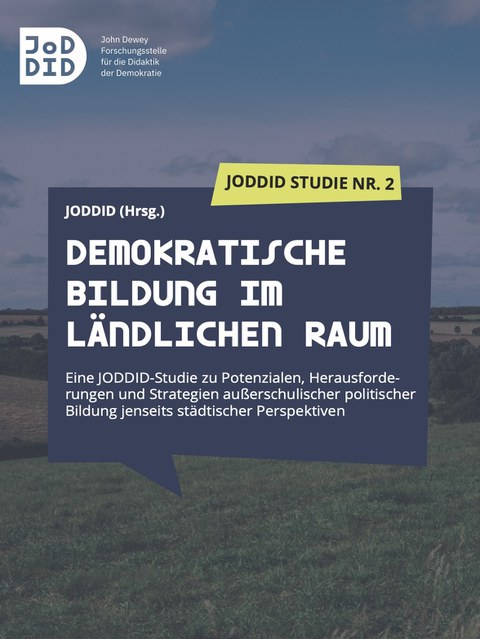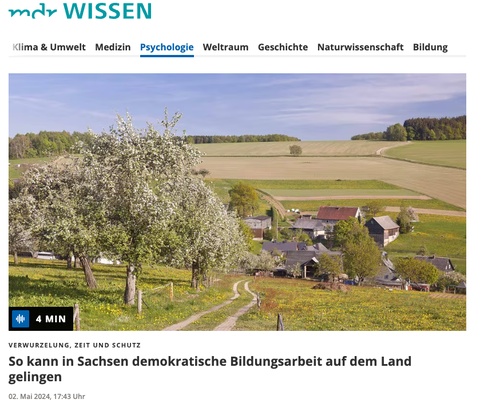Study "Democratic education in rural areas"
Download: The study can be downloaded in german here.
The study on democratic education in rural areas explores the complex challenges and potentials of political education in rural regions and discusses initial approaches to solutions. The results focus on the immediate relationships in rural areas, which are characterized by shared lifeworlds and stable interaction networks, but also by the confrontation with narrow discourse spaces, conformity constraints and attacks.
Results
The study identifies six areas of tension that must be navigated by political educators in rural areas. Among other things, it highlights the systemic challenges of funding and bureaucratic burdens as well as the need for a sustainable and inclusive approach in order to effectively shape civic education.
Democratic education in rural areas - a field of tension ...
- ... between life-world approaches and skepticism of the target groups, relationship barriers and the pressure to conform
- ... between direct access to decision-makers and obstruction by local politics and administration
- ... between a willingness to show solidarity and right-wing structures and attacks on democratic educational work
- ... between idyllic nature, structural problems and urban narrowed requirements for democratic educational work
- ... between the diversity of resources and a lack of sustainability in funding
- ... between creative freedom and didactic uncertainties
In addition, approaches to solutions are discussed that address the establishment and maintenance of relationships and networks, long-term anchoring and cooperation with local stakeholders as well as the systematic recording of attacks and their prevention. It also calls for the promotion and recognition of political education work in a targeted manner and the development of educationally implicit events that are closely aligned with the lives of the rural population. The study emphasizes the connection between long-term security of action and funding and the cultivation of trust with important local stakeholders. This requires a tailored, process-oriented financing mechanism that respects the unique context of rural settings. The authors argue for a holistic strategy of civic education funding in Saxony that not only, but especially, meets the needs of different regions.
The results show that civic education in rural areas requires specific didactic approaches that differ from urban models and require a deep understanding of local dynamics and needs. The study emphasizes the need for an adaptive, resource-conscious and long-term approach to strengthen and promote democratic participation and education in rural areas.
Finally, recommendations for action are formulated as to what JoDDiD believes could be done specifically for state policy, municipal decision-makers and educational projects in order to improve the situation for democratic education in rural areas:
Possible solutions: WHAT NEEDS TO BE DONE...
... for state policy
- Structures for moderation and mediation are needed to deal with conflicts in the context of projects for democratic education in rural areas.
- When dealing with attacks on political education, there is a need to create visibility for such attacks on the one hand, and systematic documentation, support structures, political backing and empowerment of those affected on the other.
- The funding logic must be adapted for rural areas:
- Projects must be able to create financial and time resources for networking, cooperation and relationship building,
- Programs must allow for genuine openness and flexibility in the design of approaches, formats and topics,
- Impact should be verifiable through process-oriented qualitative evaluation instead of only through quantified parameters.
- Sustainable funding structures are needed that are appropriate for rural areas, i.e. above all longer funding periods or the provision of sufficient basic funding.
- Structures for the professionalization of educators should be expanded.
- There is a need for strategic concepts for democratic education in Saxony that are cross-departmental and complementary rather than competition-based.
... for local politics
- Municipalities should promote and coordinate networking.
- Municipal structures are needed for moderation and mediation in cases of conflict.
- In municipalities, common democratic goals between all stakeholders should be identified and utilized despite diverse positions.
- Strategies for dealing with attacks and hostility should be (further) developed.
- A reflective openness towards democratic education projects and an appreciative and respectful approach should be established.
... for democratic education projects in rural areas
- As a basis for political education projects in rural areas, relationships, networks and cooperation with the population must be established in order to enable the political self-efficacy of the target group.
- Establishing access to the community and population requires a bond with gatekeepers.
- It takes staying power and a certain resilience for long-term anchoring in the region.
- Projects should develop protection concepts for attacks on educational work in cooperation with the state and municipality.
- Against the background of rural specifics, it makes sense to create education-implicit events and life-world relief offers.
- Educators need further professionalization with regard to didactics, organizational knowledge of public relations, funding structures, management and process orientation.
- Within the projects, a reflexive openness towards conservative-democratic attitudes is required.
Download: The study can be downloaded here.
Media response
The press release on the publication of the study can be found at
Click here for a summarizing report on Deutschlandfunk Nova
MDR Wissen reported on the study results here
Authors
 © JoDDiD
© JoDDiD
Research Associate
NameDavid Jugel
John-Dewey-Forschungsstelle für die Didaktik der Demokratie
Send encrypted email via the SecureMail portal (for TUD external users only).
Büro:
ABS Haus 116, Room 015 August-Bebel-Straße 30
01219 Dresden
None
Office hours:
nach Vereinbarung

Research Assistant
NameCelina Hertel
John-Dewey-Forschungsstelle für die Didaktik der Demokratie
Send encrypted email via the SecureMail portal (for TUD external users only).
Collaboration
Prof. Dr. Anja Besand
Rico Lewerenz
Celina Schönbrodt



